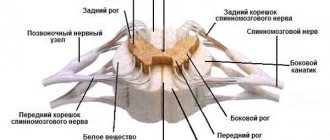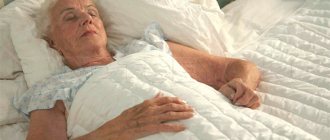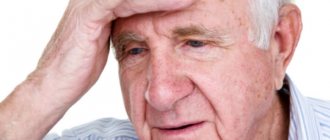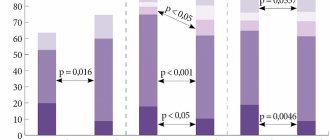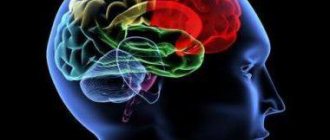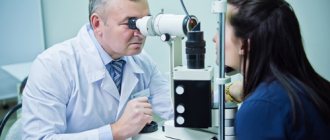The process of treating senile dementia is quite complex - the disease causes irreversible changes in the brain, and the causes of many forms of dementia are unknown. Treatment of dementia is aimed at maintaining the level of health and curbing the development of the disease; it is impossible to completely cure senile dementia.
Treatment of senile dementia is based on the use of medications. Psychotherapy, spa treatment, and changes in living conditions have no practical effectiveness.
Dementia - senile dementia
Age-related disorders of brain activity, called dementia - acquired (or senile) dementia, are caused by the death of nerve cells in the brain and manifest themselves in a decrease in mental activity, impaired memory, speech, consciousness and behavior of the sick person.
The problem is based on degenerative changes (atrophy) of brain cells and vascular disorders, leading to a lack of blood circulation and oxygen supply to the brain tissue.
According to statistics, the first, subtle symptoms in the form of partial, temporary loss of memory, time orientation and loss of some habitual skills can appear after 50 years. By the age of 60, about 3% of older people have been diagnosed with dementia. By the age of 80, 25% of the inhabitants of our planet suffer from various types of dementia.
Dementia medications for older people in the early stages of the disease
The main medications that are prescribed to relieve feelings of weakness and improve mood are modern antidepressants:
- "Venlafaxine"
Used for various mental disorders, frequent mood swings, depression, and schizophrenia. A negative effect is the presence of mild drug addiction. This is the result of the action of direct relief of norepinephrine in the formation of neural connections and connections between them.
- "Fluoxetine" ("Portal").
If the patient’s situation does not cause concern and the existing depression is mild, then Fluoxetine or its analogue “Portal” () is prescribed. This medicine works better for dementia in older people, has a milder effect and minimal side effects compared to Venlafaxine. The negative aspects are minor; a contraindication for use is individual intolerance to individual components. Impairments in thinking, speech, and memory can be eliminated by anti-dementia medications such as Aricept and Neuromidin.
- "Aricept."
Used to treat symptoms of moderate to severe dementia similar to Alzheimer's disease. Therapy with this drug is not acceptable in elderly people with pulmonary insufficiency. Also, you should not take it if your doctor has prescribed other acetylcholinesterase inhibitors. Side effects that are possible when taking the medicine are stool disturbances, nausea, abdominal pain, vomiting.
- "Neuromidin."
It will give a positive result in patients with cognitive impairment of the central nervous system.
It helps to activate impulses traveling along nerve fibers in the peripheral, central nervous systems and neuromuscular junctions. The mobility of the arms and legs returns to normal, and the person returns to normal behavior in everyday life. Contraindications for use: asthma, seizures, problems with the vestibular system. There is a type of antidepressant that helps with the primary stage of the disease. These are Prozac, Chlorprothixene, Citalopram, Fluoxetine. It is important to understand that treatment of dementia in older people with medications of this group can cause delirium and partial deterioration of well-being. It is for this reason that when prescribing them, supervision by a specialist is necessary.
In case of sleep disorders and periodically appearing feelings of anxiety, older patients are quite effectively helped by sedatives containing herbal supplements: valerian root extract, peony alcohol tincture, motherwort extract (Novopassit). These medications are safe, but the effect of taking them does not occur immediately; you need to take them for a long time. They are not potent drugs.
Read material on the topic: Sanatorium for retirees
There are different types of dementia
Dementia, depending on the causes and location of the affected areas of the brain, is divided into several types:
- Damage to the cerebral cortex - cortical dementia. A type of such dementia is Alzheimer's disease;
- Damage to white matter and subcortical structures of the brain - subcortical dementia. This type of dementia includes progressive supranuclear palsy and Parkinson's disease;
- Degenerative changes in the cortex and subcortical structures of the brain - cortical-subcortical dementia is often a consequence of diseases of the vascular system: atherosclerosis or hypertension;
- Multiple small lesions in different areas of the brain - Multifocal dementia This type of disorder is represented by Creutzfeldt-Jakob disease.
Medicines for dementia in the elderly after stroke
If a person's problems with normal blood flow are chronic, dementia will increase slowly.
When a stroke occurs, dementia can come unexpectedly. The danger lies in the opening of bleeding in the part of the brain responsible for mental abilities. There is a possibility that isolated isolated cases of deterioration in brain function may occur, but these are not considered dementia. In a situation where the disorders are complex and systemic, we are talking about dementia caused by a stroke. Signs of this type of dementia:
- constant memory impairment;
- unsteady walking;
- visual symptoms of neuralgia;
- a person cannot count numbers;
- speech and reading are difficult for the elderly;
- the patient is unable to reason adequately;
- state of depression, detachment;
- a person does not feel like a person;
- inability to apply acquired knowledge.
In this case, medications for dementia for the elderly should be of different groups:
- psychostimulants are necessary to activate the protective functions of the central nervous system (“Mesocarb”);
- nootropics can trigger brain function and restore memory (“Oxycytam”);
- glutamic acid, a drug called Cavinton, normalizes metabolism and increases blood supply to the brain;
- vitamins and minerals;
- medications "Arbiflex", "Curantil" are necessary for good blood circulation in the brain;
- the drugs “Mezapam” and “Phenazepam” relieve feelings of fear and anxiety.
Read the material on the topic: Cataracts in the elderly
Signs of dementia
The aging process is always accompanied by various changes in human behavior, but changes are different from changes. Indirect signs of senile dementia in a person may include the following behavioral deviations:
- Experiences temporary memory lapses;
- Forgets the location of ordinary things in the house, while accusing loved ones of theft;
- Experiences frequent sudden changes in mood;
- Often becomes depressed and loses interest in life;
- Loses simple household skills (tying shoelaces, boiling a kettle, turning on the TV...);
- Experiences problems with speech (slowness, distortion of speech);
- Ceases to understand interlocutors, repeatedly asks to repeat what was said;
- Loses orientation in time and space;
If you notice such symptoms in a loved one, you should contact specialized institutions. According to doctors, the progression of the disease can be slowed down with proper medical care.
Stages and symptoms of dementia
Typically, dementia progresses over many years and goes through 3 stages of development:
- Mild dementia is a condition in which the patient loses his professional skills. At the same time, his social activity decreases, interest in the world around him fades away, the person stops communicating with friends, gives up his favorite hobby, etc. With mild dementia, the patient retains all self-care skills and continues to navigate normally within his own home.
- Moderate dementia. This stage is accompanied by a condition when the patient cannot remain alone for a long time, as he loses the skills to use household appliances: telephone, TV remote control, kitchen stove. An older person may also have difficulty opening locks. It is this stage of dementia that is commonly called senile insanity. With moderate dementia, the patient retains personal hygiene and self-care skills.
- Severe dementia is senile dementia, characterized by a complete loss of a person’s adaptation to the environment and his constant dependence on outside help even in the simplest activities (dressing, eating, hygiene).
Diagnosis
An accurate diagnosis, determining the type of dementia and the degree of development of the probable causes of the disease, can only be made by a doctor (neurologist or psychiatrist). To do this, data is collected on the signs and course of the disease, the patient himself, close friends and relatives living with him are interviewed. Various medical examinations are carried out: cerebral vascular examination, blood tests, MRI... The patient is tested using neuropsychological screening scales.
Differential diagnosis
An accurate diagnosis can only be made by examining brain tissue; this is rarely possible while the patient is alive, so specialists are guided by a list of symptoms. In the process of taking an anamnesis, delirium and dementia are distinguished, and the areas of the brain in which disturbances occur are identified. First of all, the attention function is assessed; if this symptom is more pronounced than the others, a diagnosis of delirium is made, although progressive dementia can also be accompanied by a pronounced loss of attention. If a person complains of decline in memory or other cognitive functions, but these changes do not affect daily activities, it is more likely that this is also not a manifestation of dementia.
Memory impairments associated with aging are also not dementia, because if there is sufficient time to assimilate new information, the intellectual abilities of the elderly remain the same. In depression, symptoms may be similar to those of dementia, but cognitive impairment improves with treatment for depression. Elderly depressed patients show signs of cognitive decline, but unlike patients with dementia, the former tend to exaggerate memory impairment and remember important current events or personal matters.
Often, banal anemia, for example due to vitamin B12 deficiency, is confused with manifestations of dementia. Anemia may include weakness and powerlessness, pallor, loss of appetite, shortness of breath, confusion and difficulty concentrating. However, most of these symptoms are relieved by treatment of the underlying disease.
Development of the disease
At an early stage ( mild dementia ), brain dysfunction is already noticeable. The person becomes irritable and forgetful, and experiences frequent headaches. At this stage, the elderly person is still able to think critically, take care of himself and live independently.
The second, moderate degree is characterized by significant disorders of mental activity and memory. The person loses basic everyday skills and requires constant supervision from relatives, friends or a caregiver.
When moving to a severe degree of disorder, a person ceases to recognize and understand those around him; there is no longer any talk about independent self-care, even in small things. In this condition, the patient needs constant care of qualified personnel.
Often, lack of attention from loved ones does not allow us to detect signs of dementia at an early stage and take timely measures to slow down the progression of senile dementia.
Methods and methods of treatment
Problems that doctors solve when providing care to dementia patients:
- blocking and minimizing behavioral disorders;
- increasing cognitive abilities;
- improving quality of life.
The client can be treated on an outpatient basis or in a hospital - much depends on the severity of his condition.
During the work, the following techniques are used:
- Social therapy. Doctors advise relatives on the patient’s condition and the characteristics of his care.
- Psychotherapy. Both demented individuals and their immediate environment participate in the sessions. Particular attention is paid to practices that improve attention and memory characteristics.
- Pharmacotherapy. Medicines are selected that support normal brain activity.
- Psychopharmacotherapy. Drugs are used that alleviate the disorders associated with dementia.
In the case of inpatient therapy, patients attend exercise therapy, physiotherapy, massage sessions, and medicinal baths. This comprehensive treatment allows you to achieve the best results.
Does your relative have a mental disorder?
Refuses hospitalization? Are you afraid that he will harm himself and others? Call or request a free consultation.
URGENT CONSULTATION
The doctor will arrive within 1 hour . We'll take you to the hospital ourselves. Emergency hospitalization - around the clock!
Causes of dementia
What are the causes of the death of nerve cells in the brain and the development of acquired dementia? Doctors agree that brain disorders can be caused by many different diseases and negative factors that can destroy brain vessels:
- Diseases of the vascular system Disturbances in the functioning of blood vessels lead to a lack of blood and oxygen supply to brain tissue with all the ensuing consequences;
- Infectious diseases Damage to brain tissue by various viruses, bacteria or toxins due to encephalitis, meningitis, AIDS and other viral diseases often leads to disruption of brain activity;
- Oncological diseases Various tumors, hemorrhages and inflammatory processes affecting the cerebral cortex often cause various disorders with signs of dementia...
- Traumatic brain injuries Physical destruction of brain tissue naturally leads to the death of nerve cells.
- Alcohol and drug abuse Long-term destructive effects of various toxins on nerve cells cannot but affect brain activity.
- Metabolic disorders A whole bunch of hormonal diseases, kidney and liver diseases lead to the accumulation of harmful substances in the blood that adversely affect brain activity.
There is no point in listing all the “risk factors” that, according to modern medicine, can lead a person to dementia. In such a situation, it would seem like a miracle for any person to live to be 80 years old and retain his sanity.
On the other hand, it is never possible to say exactly what exactly was the impetus for the development of senile dementia. If this misfortune happens to a loved one, be patient and contact a specialist...
Drug treatment of the disease - medications used
Traditional treatment for dementia is pointless - specialized medications must be used. Doctors at the Cordia clinic select them taking into account the stage of the disease and the severity of its course.
Help with dementia disorders:
- Drugs that improve brain activity. This refers to anticholinesterase medications and NMDA glutamate receptor blockers. They have neuroprotective properties, do not allow neurons to be destroyed, and enhance the transmission of nerve impulses. With their help, it is possible to improve memory and increase focus.
- Neuroleptics. Used to correct behavioral abnormalities. Reduce psychomotor excitability, perception deception, delirium. Since medications in this group often cause unwanted side effects, they can only be used under constant medical supervision.
- Antidepressants. Fighting depression. May contain fluoxetine, mianserin, fluvoxamine maleate and other active substances. The selection of a suitable medicine can only be carried out by a qualified doctor.
Since patients with dementia often complain of light sleep and insomnia, many are additionally prescribed sleeping pills.
Dementia treatment
When dementia is diagnosed at an early stage, medication to support brain activity and exercises to train and restore cognitive function can be done at home. In any case, it is necessary to eliminate from the patient’s life the factors that influenced the development of the disease.
If you do not have enough time or a loved one’s illness has reached a more severe stage, you should think about choosing a nurse with a medical education or a specialized boarding house.
Professional care and services for an elderly person suffering from dementia is difficult to organize at home if relatives are constantly at work.
A specialized boarding house for people with dementia and other cognitive disorders, providing qualified care, treatment under the supervision of competent doctors and psychological support for the elderly.
How are patients treated in a hospital?
Hospitalization is indicated at any stage of the disease. At the initial stages, it is needed to select the optimal treatment that will slow down the progression of dementia. In the later form, doctors take measures to alleviate the patient’s condition, provide him with high-quality and complete care, and improve his quality of life.
At the Cordia hospital, patients are monitored around the clock. For each applicant, specialists develop unique treatment programs that allow them to achieve positive results in a short time.
It is important to understand that it is impossible to completely cure dementia, but it is possible to stop its progression. To do this, you need to be observed by experienced doctors. Make an appointment with Cordia doctors by calling +7 (495) 268-09-02 . We are ready to help you and your loved ones.
Care, recovery, rehabilitation, elderly people with dementia
Our boarding house staff have the necessary skills and experience working with patients suffering from various cognitive impairments. Our nurses and carers know how to care for older people with memory loss and ensure their safety. We provide:
- adapted, safe premises for people with brain disorders;
- constant supervision by trained staff of the boarding house;
- balanced dietary nutrition, taking into account age needs and medical recommendations;
- assistance to residents of the boarding house in eating, hygiene procedures, careful care for bedridden patients;
- necessary medical procedures, exercises to support cognitive skills, motor skills;
- psychological assistance during rehabilitation.
Not old age, but illness
According to statistics, approximately 80% of people over 60 years of age have some form of cognitive impairment. The older the person, the higher the risk. The statistics are confirmed by numerous studies, in particular those conducted by employees of the Russian Gerontological Research and Clinical Center among elderly visitors to city clinics. 8% of them had severe impairments (dementia), and 46% had moderate cognitive impairment. Because the problem is so widespread, many people consider it normal. Like, old age is not a joy, of course. And that’s why they don’t turn to doctors until, alas, they lose the opportunity not only to work, but even to care for themselves. However, neurologists are confident: old age and dementia are not synonymous, and it is possible to live to an old age with sound mind and strong memory. But at the first alarming symptoms, you should immediately contact a neurologist or geriatrician and begin treatment. This will preserve a person’s independence for 10 years, whereas without treatment he will become severely disabled in 3 years.
Click to enlarge
Exercises to train your brain
- Forming words in your mind in reverse (cat - current, needle - algi). You need to start with short words of 3 letters, then the number of letters increases.
- Making new words from one by changing letters. For example, from the word “bottle”: bull, rear, bun, smile...
- Finish the saying. The point is to complete the second part of a famous proverb, riddle or saying. For example, “To be afraid of wolves - ...”, “Forty clothes - ...”, “Without difficulty - ...”.
- Drawing geometric shapes in mirror reflection. You need to start with simple triangles and rhombuses, then the shapes can be more complicated.
- The fourth one is extra. You need to find the odd one out among the four words and explain why. For example, owl, wolf, crow, black grouse. (A wolf is not a bird, it is superfluous.)
- Children's games. For example, you can play an analogue of the game: “I know 5 boys’ names.” This way you can remember the names of vegetables, kitchen utensils, etc. There may not be 5, but 7 or more.
Don't lose your head!
Treating dementia on the advice of a neighbor, a pharmacist at a pharmacy, or a doctor on TV is very dangerous. By using the wrong thing, you can waste valuable time. For example, in Alzheimer's disease, vascular nootropic drugs do not help at all. For vascular dementia, nootropics are used, but not just any one, but only with a certain mechanism of action and in different dosages, so their choice is strictly up to the neurologist. In addition, different types of dementia require the inclusion of different additional medications: for vascular dementia, drugs for correcting the cardiovascular system (statins, antiplatelet agents, anticoagulants) are needed, for frontotemporal dementia - antidepressants. And, for example, with dementia with Lewy bodies, patients have increased sensitivity to antipsychotics. Such a patient comes to a psychiatrist with hallucinations, he is prescribed haloperidol, and due to increased sensitivity to this medicine, even a couple of drops can greatly worsen cognitive abilities.
And even taking those medications that are used in the treatment of all types of dementia (there are 4 of these drugs in total) cannot be done at your own discretion. Their choice, dosage and sequence of administration depend on the type of disorder. Therefore, the first step is to make an accurate diagnosis. To do this, it is first necessary to conduct neuropsychological testing. So far, only neurologists and geriatricians can carry it out, but soon all first-line doctors will have to master this skill. Based on neuropsychological testing, the doctor will prescribe further examination (ultrasound of neck vessels, MRI of the brain, etc.). You should not rush to conduct an expensive study yourself - after all, only a doctor can recommend what exactly needs to be studied and on what device.
Article on the topic
TV and monotonous work. What and how leads a person to dementia
